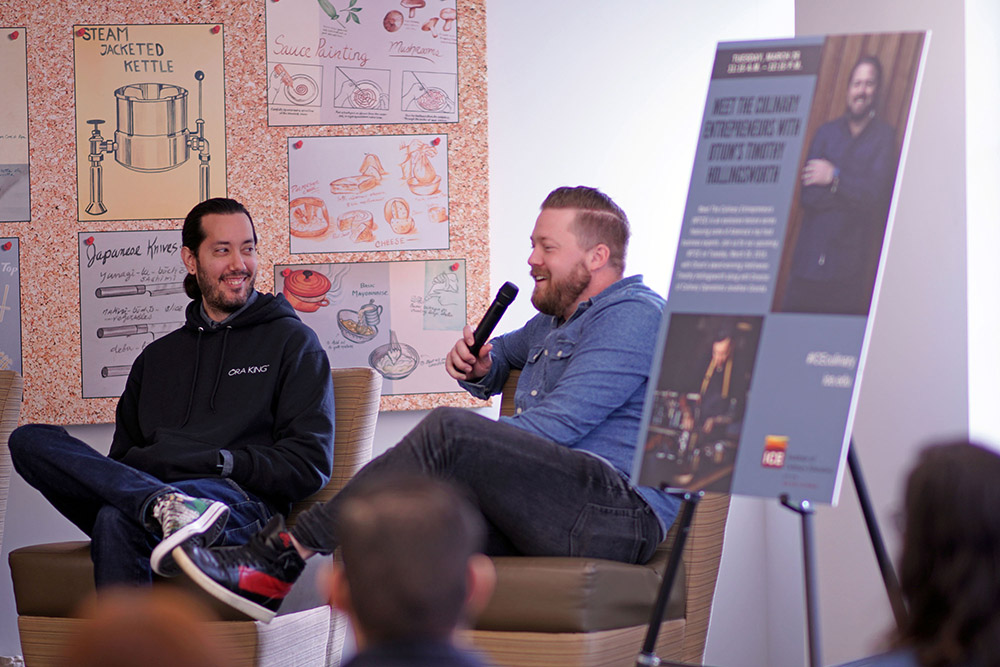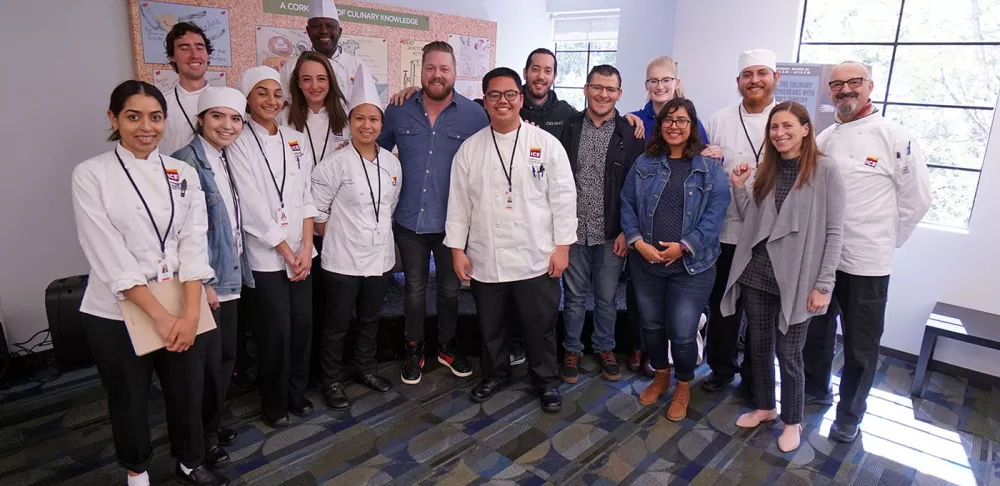Timothy Hollingsworth is the chef and owner behind Downtown Los Angeles restaurant Otium, as well as C.J. Boyd’s Fried Chicken and Free Play at The Fields LA. You may know him from “The Final Table” on Netflix, which he won.
Chef Timothy and Otium’s director of culinary operations Jonathan Granada, visited the Institute of Culinary Education to share advice on managing employees, career focus and business acumen. Here are the highlights.
On the Michelin Guide returning to LA:
When I was younger, it was all about Michelin stars. I wanted to go to France, not to work at a normal restaurant — I wanted to work at a three-Michelin-starred restaurant. Understanding the history behind it is very important, and LA is an interesting place to talk about Michelin. LA is a city that arguably Jonathan Gold defined from a culinary standpoint, by celebrating all the different ethnic restaurants and strip malls. Saying, “Hey I’m going to San Gabriel or East LA or wherever these pocket restaurants are. I’m going to go check out these tacos in a tire shop!”
I think [Michelin] is good for some restaurants and ultimately, the people who are against Michelin — I don’t think they should be. What they are worried about is that LA loses what it is. It’s up to us to make sure that those restaurants are still around, that those restaurants are still noted and valued. And when someone asks me where to eat or if a publication asks me, “What are your five favorite restaurants in LA?” It’s my job to continue to name some of those restaurants. It’s my job to put some of those places front and center on the map.
On operating restaurants in the wake of a minimum wage increase:
It’s important to be looking to the future. We’ve known minimum wage is going to go up and we’ve restructured. Typically, if I were to ask someone in this business what the numbers should be percentage-wise, they would say you should have 30% food costs, 30% labor costs, 20% occupancy costs and a 20% profit. That would be ideal. But that’s textbook and that’s old — that doesn’t really exist anymore.
To be very honest, it’s tough to operate a business at this point. People are putting service charges on [the bill], people are raising prices on their menus, some people are sacrificing quality because they have no choice, and I think it’s really tough for the smaller restaurants. We’re very fortunate to be busy. If we were a much smaller restaurant, it would be much more difficult for us.

On what he looks for in future employees:
Hospitality is something that can be taught, and yes, it can be trained. But ultimately, if you come into my house, hopefully I’ll offer you a glass of water. If you’re coming to the door, hopefully I open that door for you. Those are innate things that show that you care about people and that you care what other people are doing. What we try to do is really train people, and if you’re working in the kitchen and you’re working pastry, and you’re right there at the center stage, you have guests walking past you all night long. You have to say hello, you have to smile, you have to acknowledge those people. At the end of the day, my desire is to cook really, really good food, but ultimately I’m cooking really good food for my guests. And those guests in the restaurant are the ones that are going to be returning and helping me and allowing me to do what I do. Being hospitable would be the first thing I look for.
On what young chefs should focus on:
Whatever your department is, focus on that small piece. If you try to focus on too many things at once, you’re going to be mediocre at all of them, at best. You need to find or shrink the focus into minute things. If you’re working the fish station, hopefully you’re reading about fish when you go home. If you’re working butchery or garde manger, you’re reading about salads. That’s really important, focusing on those small things.
On success:
The work you’re doing right now is not to get the best grade in school, it’s not to go work at the best restaurant, it’s for you guys to be successful, and it is extremely important. The most important advice I can give is that you define your own success. I’ve been very fortunate to be in a position that I am in today, very fortunate to have had the path that I have today. A lot of that is right time, right place, but the majority of it is going to be that I put in the work. I have the desire. I said, “Yes, I’m going to take that job.” I said, “Yes, I’m going to compete in the Bocuse d’Or.” I said, “Yes, I’m going to compete on Netflix.” Just saying yes when the opportunity comes is very important.
Say yes to defining your success with culinary career training in Los Angeles.




